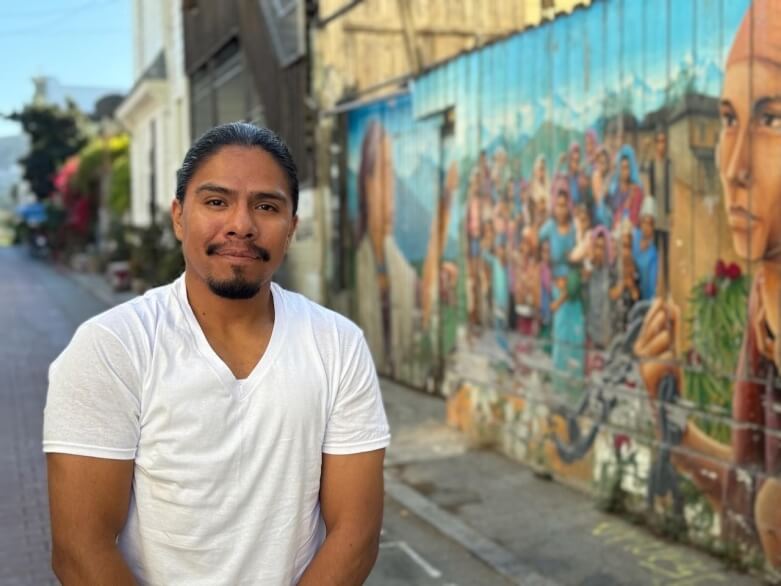Jose Ruben's Story
Page Media

Jose Ruben Hernandez Gomez, one of the hunger strikers who contributed to the detention database, endured many hardships during his 16 months in ICE custody at Mesa Verde Detention Facility. He filed more than 60 grievances on issues including poor sanitation, abusive treatment from facility staff, the lack of clean water, and expired food. He also cataloged the negligent medical care individuals in detention received such as long delays before they were allowed to visit medical providers and insufficient COVID-19 prevention measures at the height of the pandemic.
The centers did not make it easy to learn how to submit grievances. Instructions on how to submit grievances are not readily available, so Jose Ruben only learned how to do so from outside advocates. He taught other detained people to use the grievance process by working with those who were illiterate or spoke only Spanish.
GEO Group, the private contractor that runs the Mesa Verde Detention Facility for ICE, rejected most of Jose Ruben’s grievances. When he tried to gather evidence in support, like video footage after he reported sexually abusive pat downs, his requests were ignored. Instead, GEO Group employes retaliated. Officers would use an aggressive tone towards him or harass him. When he raised these incidents, they would claim they never happened. Sometimes, they would tauntingly tell him to “go ahead and grievance me.” Still, he kept trying, so eventually they put him in solitary confinement.
Frustrated with the abuse and lack of accountability, Jose Ruben and other advocates started a hunger strike. For eighteen days they refused food. On March 7, 2023, officers violently dragged him out of the center and put him on an airplane to El Paso, Texas. On the way, they groped him. He feared that he would never see his family again.
In Texas, immigration detention officers locked him in solitary confinement and threatened to force feed him by putting a tube down his throat. Jose Ruben decided to break his fast and asked the facility to provide vitamins and electrolytes so he could do so safely. He knew the risks of refeeding syndrome, a dangerous condition caused by the sudden reintroduction of food after a lengthy period of starvation.
Instead, under the orders of the on-staff medical doctor, immigration detention officers gave him two cold burgers, french fries, and juice. After Jose Ruben ate the food, he began to feel dizzy and disoriented, but staff refused to take him to a doctor. Instead, they boarded him back on a plane to Mesa Verde Detention Facility.
Jose Ruben’s symptoms worsened to the point he had to be hospitalized at Dignity Health Mercy Hospital in Bakersfield.
For the next five days, Jose Ruben had cognitive difficulty, slurred speech, vertigo, and persistent headaches. He was in and out of the hospital due to nutritional deficiency, dehydration, and potential pneumonia in his right-lung. When he was discharged from the hospital and held in solitary confinement at Mesa Verde ICE Detention Facility, he kept experiencing neurological symptoms. He was chronically dizzy, could not sleep, and would frequently lose his balance. One day, he fell hard, hit his head, and suffered a concussion. When he tried to get medical assistance, facility staff refused to help. He filed more grievances, but they came to nothing.
Jose Ruben continues to suffer from chronic dizziness, improper sleep, trouble walking, and mental trauma. Reflecting on the grievances, Jose Ruben said they “discourage people, you put so much time and work into them, it makes you feel like it is not going anywhere…These detention centers are not safe to be holding human beings and when people want to stand up for themselves, they are ignored.”
Since his release from detention in April 2023, Jose Ruben has enjoyed spending time with his elderly parents, playing with his nephews, and appreciating his freedom. He eats well and takes care of his health now that he has the power to make those decisions for himself. Unfortunately, due to the injuries he suffered and endured while in immigration detention, Jose Ruben is unable to work and the neurological issues he experiences affect his ability to drive. He is also receiving trauma-informed therapy for his anxiety, depression, and post-traumatic stress disorder from his time in ICE custody.
Jose Ruben continues to advocate for people in detention and hopes to go to college to become a counselor for at-risk youth. Jose Ruben aims to use his life experiences to help others. His goal is now to “break those chains that I have witnessed and experienced.”
Read more about our report and other stories like Jose Ruben's.
